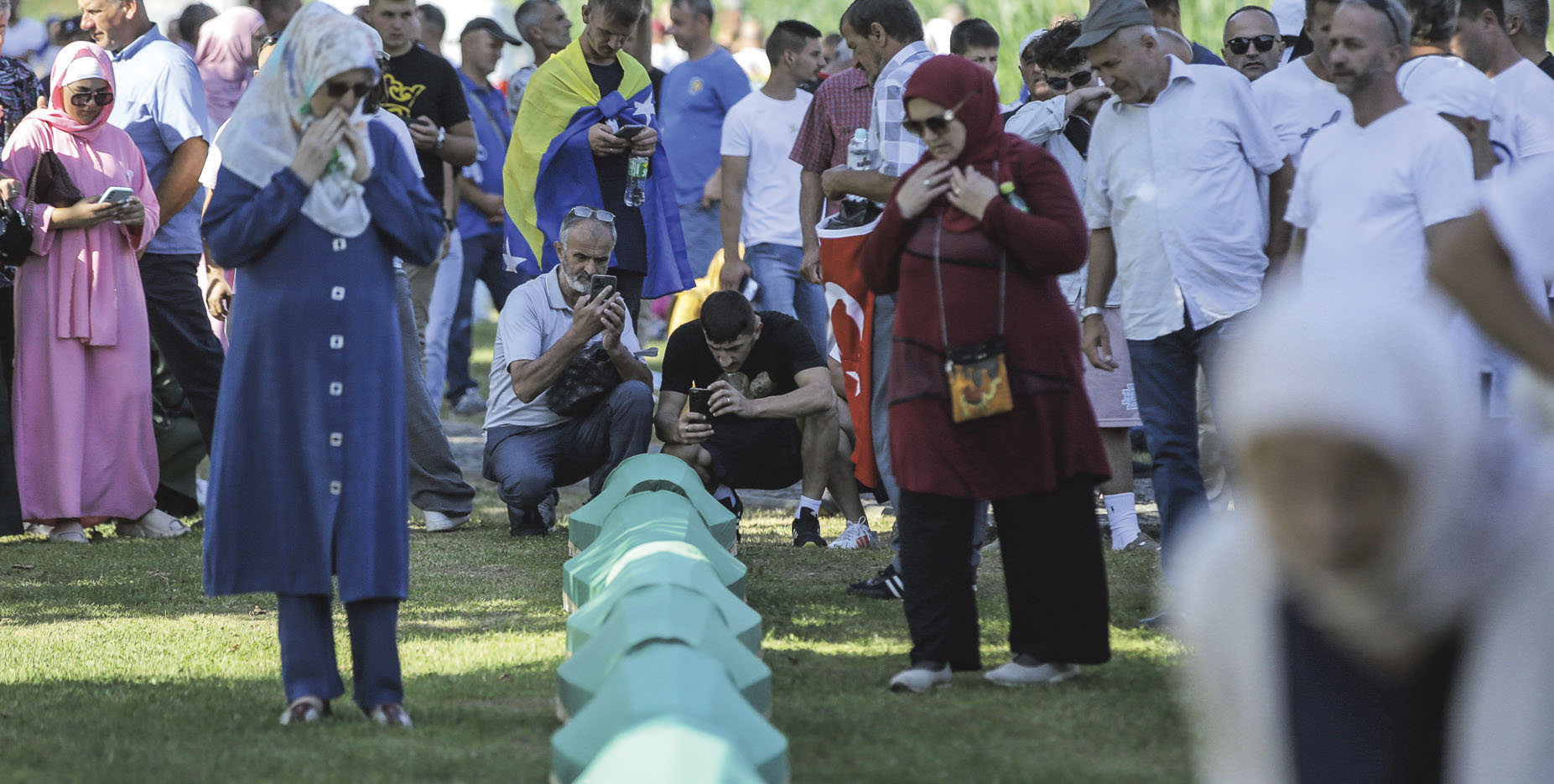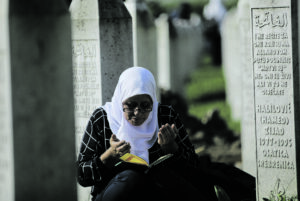
Family members grieve for their loved ones as the bodies of 14 more recently identified victims of the Srebrenica Genocide are brought to the village for burial at the Potočari-Srebrenica Memorial Cemetery on the anniversary of the genocide in Potočari, Bosnia and Herzegovina, on July 11, 2024. (Credit: Samır Jordamovıc/AA)
Elham Asaad Buaras
On July 11, thousands gathered in the Bosnian town of Srebrenica to mark the 29th anniversary of the massacre in which over 8,372 Bosnian Muslim men, teens, and boys were brutally executed by Serb forces during the Bosnian War. This solemn commemoration took place amid ongoing violence in Gaza, drawing poignant parallels with the current Israeli assault, as noted by activists and commentators alike.
This year’s commemorations were more formalized, recognized for the first time as the International Day of Reflection and Commemoration of the 1995 Genocide in Srebrenica, following a UN General Assembly resolution adopted on May 23.
The Bosnian War of 1992-1995, a conflict among Bosnia and Herzegovina’s Croats, Muslims, and Serbs, claimed around 100,000 lives and left the nation deeply divided along ethnic lines. Ethnic cleansing was rampant, and the Srebrenica massacre has been officially recognized as genocide by numerous international bodies, including the UN.
High Representative/Vice-President Josep Borrell and Commissioner Olivér Várhelyi of the European Union made a joint statement commemorating the 29th anniversary of the Srebrenica genocide. They said, “It is our duty to honour the memory of the over 8,300 boys and men who were systematically murdered in the hills around Srebrenica. We call upon leaders to reject divisive rhetoric and act with truth, justice, trust, and dialogue.”

POTOCARI, BOSNIA AND HERZEGOVINA – JULY 11: Family members grieve for their loved ones as the bodies of 14 more recently identified victims of the Srebrenica Genocide are brought to the village for burial at the Potočari-Srebrenica Memorial Cemetery on the anniversary of the genocide. (Credit: Samır Jordamovıc/AA)
They emphasized the importance of acknowledging and teaching historical facts, remembering the victims, identifying the missing, and bringing perpetrators to justice as crucial steps toward healing and reconciliation.
The US Department of State also released a statement emphasizing, committment “to supporting justice for the victims and survivors. We must continue to honour their memory by promoting accountability and reconciliation. It is essential to confront the horrors of the past and educate future generations to prevent such atrocities from occurring again.”
The US Ambassador to Bosnia and Herzegovina Michael Murphy and Deputy to the Ambassador-at-Large for Global Criminal Justice David Mandel-Anthony attended a memorial in Srebrenica to honour the victims, stand in solidarity with mourners, and encourage reconciliation.
Across the pond remembrance, the UK government reaffirmed its commitment to remembering the victims and supporting the survivors. A ceremony was held in West Northamptonshire where officials and community members gathered to honour the victims with speeches and a moment of silence. The organization Remembering Srebrenica highlighted the importance of standing against hatred and fostering interconnected communities.
The remains of 14 more massacre victims, including a 17-year-old boy, were laid to rest at the memorial cemetery in Potočari, just outside Srebrenica. The youngest victim buried this year, Beriz Mujić, was born in 1978 in Zvornik and was only 17 when he was killed in the Suceska area near Bratunac. His remains were discovered 28 years later and exhumed in May 2023. Beriz now rests beside his brother Hazim, who was buried in 2013, while their father, Omer Mujić, remains missing.
The oldest victim buried this year is Hamed Salic, born in 1927. He was 68 when he went missing in the summer of 1995 in Zepa. His remains were exhumed in May 2014 and recently identified. This year’s funeral brings the total number of burials at the cemetery to 6,765.
Among those participating in the commemorations at Potočari was Palestinian journalist Motaz Azaiza, who fled Gaza in January with some family members, underscoring the universal resonance of Srebrenica’s tragic legacy.
“I want to thank the people who raised the flags of Palestine alongside the flags of Bosnia and Herzegovina. I wasn’t born when all this happened in Srebrenica,” the photojournalist told reporters at the ceremony. “Since I was little, I listened to what happened here, through the news, through friends. The people here have great support from the people of Palestine, and I thank you for your solidarity.”
Several campaigners and politicians, including Benjamina Karić, the mayor of Sarajevo, have drawn direct comparisons between Srebrenica and Gaza. Writing on social media on July 11, Karić branded the killings in Gaza a “genocide”.
“The reaction of the world public to these terrible and painful wounds on the body of Bosnia and Herzegovina was: ‘Never again!’ Today, three decades later, we are witnessing the terrible crimes and genocide being carried out against the people of Palestine,” she said.
Although Israel and Bosnia and Herzegovina have enjoyed strong relations since the latter’s formation in the 1990s, the ongoing Gaza war has strained these ties. Numerous pro-Palestinian demonstrations have taken place across Bosnia and Herzegovina, with the most notable one occurring on October 22, 2023, in Sarajevo.
Thousands gathered in the capital to show solidarity with Palestinians amid the escalating conflict between Israel and Palestinians. This demonstration was part of a broader wave of pro-Palestinian protests across the Balkans, including Montenegro and Serbia, calling for peace and an end to the humanitarian crisis in Gaza.
The Srebrenica Memorial Centre uncovered 90 new cases of denial, including outright rejection of genocide, attempts to minimize the events, backing for those responsible, and claims that the atrocities committed weren’t genocide.
In May, the UN General Assembly designated July 11 as the International Day of Reflection and Commemoration of the 1995 Genocide in Srebrenica. This resolution also tasked the Secretary-General with establishing an outreach program on the Srebrenica genocide in preparation for its 30th anniversary next year.
The Assembly condemned any denial of the Srebrenica genocide and urged Member States to preserve the facts through educational systems to prevent denial, distortion, and future genocides.
The resolution faced opposition from Serbia and Serb leaders. Serbian President Aleksandar Vučić and Milorad Dodik, President of Republika Srpska, have rejected the genocide designation, claiming it fosters division and undermines reconciliation efforts.
Among them, Yahel Vilan, Israel’s Ambassador to Serbia, caused an outcry when he said that he did not believe the events in Srebrenica constituted genocide.
Speaking with the Kremlin-controlled Sputnik news agency, Vilan stated that calling the mass execution committed by Bosnian Serb troops in Srebrenica a genocide “diminishes the importance of that term, which, in my opinion, should only be used for genocides.”
“And Israel was invited to The Hague because of the alleged genocide in Gaza. For me, Srebrenica should not be called genocide,” Vilan said, referencing the recent South African motion accusing Israel of genocide before the International Court of Justice.
Bosnian Foreign Minister, Elmedin Konaković called Vilan’s comments “shameful”, saying they were “not only deeply wrong but also insulting to the victims and survivors of the genocide in Srebrenica, as well as to all those who hold to truth and justice in the international community”.
In Bosnia and Herzegovina, separatist leaders in Republika Srpska, one of the country’s main political entities alongside the Federation of Bosnia and Herzegovina under the 1995 Dayton Agreement, consistently reject calling the Srebrenica massacre genocide.
During his ICTY trial, Radovan Karadžić, President of Republika Srpska, argued that despite the severity of the events, they did not amount to genocide. Vojislav Šešelj, leader of the Serbian Radical Party, dismissed the Srebrenica genocide as a fabrication in his 2007 trial. Dodik called it a myth on the massacre’s anniversary in July 2007. Tomislav Nikolić, former President of Serbia, acknowledged serious war crimes but denied genocide in a 2013 interview. Aleksandar Vulin, Serbia’s former Minister of Internal Affairs, echoed similar sentiments in July 2015, describing Srebrenica as a war crime rather than genocide.